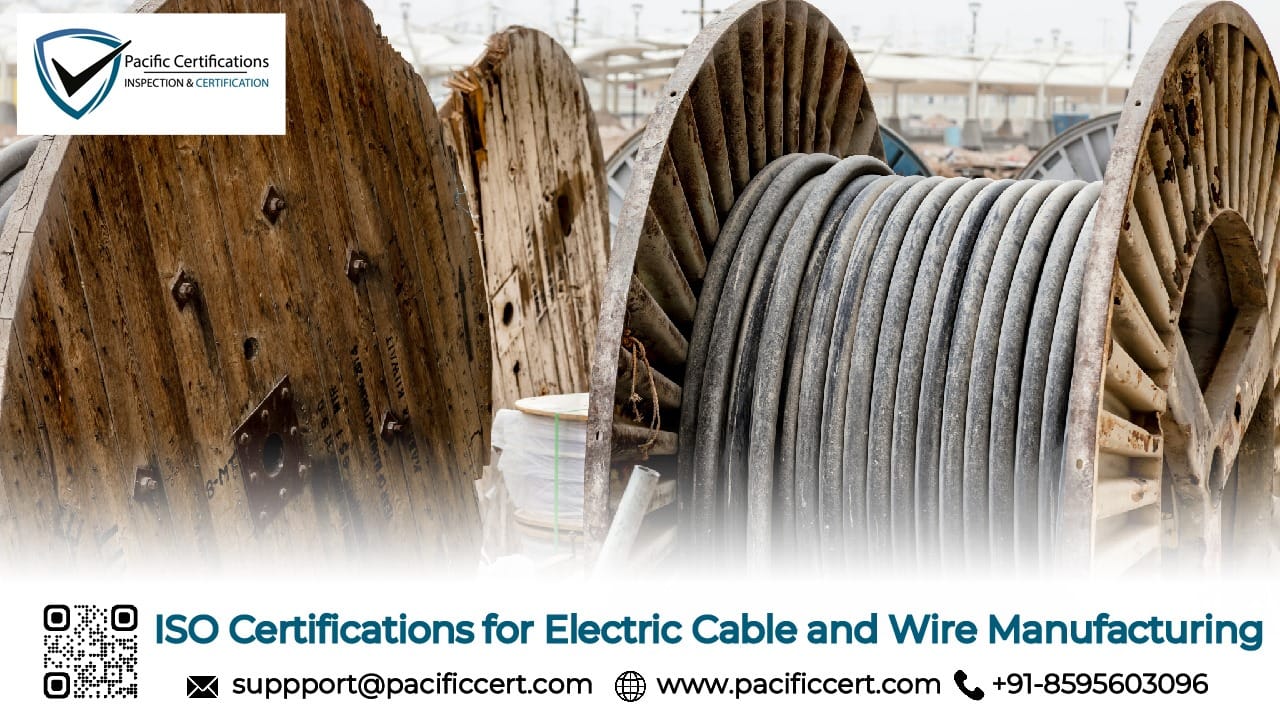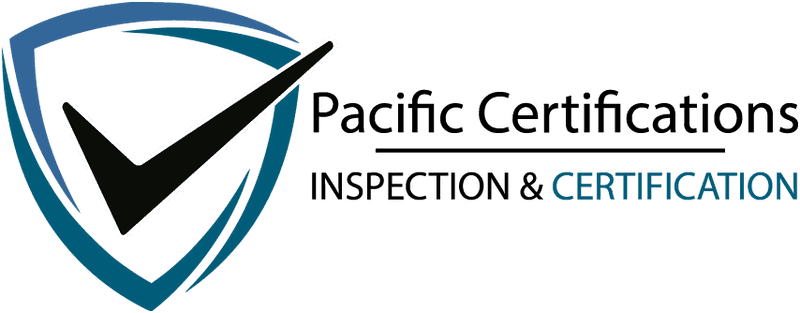ISO Certifications for Electric Cable and Wire Manufacturing Businesses, Requirements and Benefits

Introduction
Electric cables and wiring are fundamental to energy infrastructure, buildings, vehicles, and industrial equipment. The industry operates under tight performance and safety requirements, a minor defect in insulation, conductivity, or labeling can cause serious failures. In recent years, the global wire and cable market has expanded due to electrification, renewable-energy projects, and urban development.
According to Grand View Research, the global wire and cable market surpassed USD 220 billion in 2024 and is projected to grow at over 5 % CAGR through 2030, driven by smart-grid upgrades, EV charging systems, and renewable installations. As competition grows, ISO certifications provide manufacturers with structured systems for quality, safety, and sustainability, making them trusted suppliers to utilities, EPC contractors, and OEMs.
Electric cables may seem simple, but they connect entire industries. Quality and consistency determine not just performance — but safety, reliability, and trust
If you’re seeking ISO certification for your Electric Cable and Wire Manufacturing business, reach out to us at [email protected].
Quick Summary
ISO certifications help cable and wire manufacturers manage production quality, maintain worker safety, comply with environmental laws, and improve traceability, all critical for product reliability and export readiness.
Applicable ISO Standards for Electric Cable and Wire Manufacturing
ISO Standard | Focus Area | Industry Relevance |
|---|---|---|
ISO 9001:2015 | Quality Management | Ensures uniform production, inspection, and customer satisfaction. |
ISO 14001:2015 | Environmental Management | Controls emissions, waste, and resource efficiency in extrusion and coating operations. |
ISO 45001:2018 | Occupational Health & Safety | Prevents workplace injuries during handling, drawing, and spooling. |
ISO 50001:2018 | Energy Management | Optimizes electricity use in heating furnaces, drawing machines, and cooling systems. |
ISO 17025:2017 | Testing & Calibration Labs | Validates accuracy of product testing for resistance, tensile strength, and flame tests. |
ISO 22301:2019 | Business Continuity | Keeps production running during supply or power disruptions. |
ISO 9001 sets the standards for a quality management system (QMS) ensuring manufacturers can consistently deliver high-quality products. Implementing ISO 9001 allows businesses to refine processes, improve efficiency, and enhance customer satisfaction.
ISO 14001 - Environmental Management
Environmental responsibility is paramount in the manufacturing sector, and ISO 14001 certification helps businesses minimize their environmental footprint. This standard provides a framework to establish eco-friendly practices, reducing waste, pollution, and resource consumption.
ISO 45001 - Occupational Health and Safety
ISO 45001 addresses workplace safety, aiming to prevent accidents, injuries, and health hazards. Adopting this standard demonstrates a company’s commitment to safeguarding its employees, an essential aspect for any manufacturing operation.
ISO 27001 - Information Security Management
In an increasingly digital world, ISO 27001 helps companies protect sensitive information. This is crucial in the manufacturing industry, where safeguarding intellectual property and operational data is vital.
ISO 50001 supports organizations in establishing energy management systems (EnMS) that optimize energy use, reduce costs, and lower environmental impact—an increasingly important area given the industry’s high energy requirements.
ISO 17025 - Testing and Calibration Laboratories
ISO 17025 ensures testing and calibration processes are reliable and accurate, which is crucial in cable manufacturing where precise measurements impact quality and safety.
Click here to find out more applicable standards to your industry
For ISO certification in Electric Cable and Wire Manufacturing, connect with our team at [email protected] or call +91-8595603096. We’re here to help.
What are the requirements of ISO Certifications for Electric Cable and Wire Manufacturing?
Manufacturers must show that every process from raw-material intake to finished cable dispatch — is controlled, measured, and traceable. Below are the general requirements and specific requirements:
General requirements:
Define scope of manufacturing – Identify cable types (power, data, fiber-optic, instrumentation) and applicable standards for each product line.
Establish quality and safety policies – Draft measurable objectives covering tensile strength, resistance, insulation, and operator safety.
Process control and monitoring – Document production stages, maintain inspection logs for extrusion, annealing, and braiding lines.
Material traceability – Implement batch numbering and supplier evaluation to trace copper, aluminum, or polymer sources.
Calibration and testing systems – Maintain laboratory records aligned with ISO 17025 to prove test reliability.
Environmental and energy control – Record emissions, energy consumption, and recycling activities for ISO 14001 / 50001 compliance.
Training and awareness – Ensure operators, supervisors, and QA staff understand the documented procedures.
Internal audits and management review – Evaluate performance, non-conformities, and corrective actions on a planned basis.
Specific requirements:
ISO 9001 – Quality Management System (QMS)
- Documented Quality Policy and Objectives: Develop a clear quality policy and set measurable quality objectives aligned with the organization’s goals.
- Process Control and Standardization: Define and document all core processes, ensuring consistency and reliability in production.
- Customer Focus and Satisfaction: Implement processes to gather customer feedback and continually improve products based on customer requirements.
- Risk-Based Thinking: Identify risks related to quality and establish preventive actions to mitigate those risks.
- Performance Measurement: Monitor, measure, and analyze processes to ensure they meet quality objectives, using metrics like defect rates and customer satisfaction.
- Internal Audits and Management Review: Conduct regular internal audits and management reviews to ensure compliance with the QMS and identify opportunities for improvement.
ISO 14001 – Environmental Management System (EMS)
- Environmental Policy: Create an environmental policy that reflects the organization’s commitment to environmental protection and continuous improvement.
- Identification of Environmental Aspects: Identify and evaluate environmental aspects of the organization’s activities, such as emissions, waste, and resource usage.
- Compliance with Environmental Legislation: Ensure that all operations comply with applicable environmental laws and regulations.
- Setting Environmental Objectives and Targets: Set measurable environmental objectives, such as reducing waste or energy use, with clear targets and timelines.
- Operational Control and Emergency Preparedness: Implement controls to manage environmental impacts and establish emergency preparedness procedures to respond to environmental incidents.
- Continuous Improvement through Environmental Audits: Conduct regular audits to assess environmental performance and identify areas for improvement.
ISO 45001 – Occupational Health and Safety Management System (OHSMS)
- Health and Safety Policy: Establish a health and safety policy outlining the commitment to employee safety and risk reduction.
- Hazard Identification and Risk Assessment: Identify hazards in the workplace, assess associated risks, and take action to minimize them.
- Compliance with Health and Safety Legislation: Adhere to all legal requirements related to health and safety.
- Employee Participation and Consultation: Engage employees in identifying hazards and participate in safety discussions and improvements.
- Emergency Preparedness and Response: Develop plans and training for responding to emergencies, including evacuation procedures and first-aid support.
- Monitoring and Incident Reporting: Track safety performance, report incidents, and investigate accidents to prevent recurrence.
ISO 27001 – Information Security Management System (ISMS)
- Information Security Policy: Define a security policy that addresses the organization’s commitment to protecting information.
- Risk Assessment and Treatment: Identify information security risks, assess their impact, and implement controls to mitigate them.
- Access Control: Establish access restrictions and data encryption to safeguard sensitive information.
- Information Security Incident Management: Develop procedures for reporting and managing information security incidents.
- Compliance with Legal and Regulatory Requirements: Ensure that information management practices comply with data protection laws and regulations.
- Regular Security Audits: Conduct audits to evaluate the effectiveness of the information security management system and identify areas for improvement.
ISO 50001 – Energy Management System (EnMS)
- Energy Policy: Establish an energy policy that demonstrates a commitment to reducing energy consumption and environmental impact.
- Energy Review and Baseline Setting: Perform an energy review to identify significant energy uses and establish a baseline for measurement.
- Setting Energy Objectives and Targets: Define measurable energy efficiency goals, such as reducing energy consumption by a set percentage.
- Energy Performance Indicators (EnPIs): Identify and use indicators to measure energy performance and track improvements.
- Operational Controls for Energy Management: Implement controls on energy use in equipment and production processes to ensure efficiency.
- Energy Monitoring and Analysis: Monitor energy use continuously, analyze data for improvement opportunities, and assess progress toward targets.
Tip: Start by documenting one production line in detail , once the first is systemized, extend the same structure to other lines for faster certification rollout.
Get in touch at [email protected] or by phone at +91-8595603096.
What are the benefits of ISO Certifications for Electric Cable and Wire Manufacturing?
ISO certification provides measurable, long-term value for cable and wire manufacturers, improving how they manage production, reduce waste, and win client confidence across industrial and infrastructure markets. Below are the key benefits:
- ISO certification maintains uniform production quality, reducing product defects and field failures while ensuring compliance with electrical safety standards.
- It builds long-term customer confidence, helping manufacturers secure supply contracts with utilities, EPC companies, and major industrial clients.
- Safer operations under ISO 45001 reduce accidents and insurance claims, creating a more secure working environment for plant and maintenance staff.
- ISO 14001 supports environmental accountability by managing emissions, waste, and recycling, improving reputation among regulators and buyers.
- ISO 50001 helps control energy consumption in high-power machinery such as extruders and annealing furnaces, cutting electricity costs.
- Testing aligned with ISO 17025 assures clients that product performance results are reliable, traceable, and accepted across global markets.
- Certification strengthens eligibility for government projects, defense contracts, and export tenders that demand documented
How Pacific Certifications Can Help
Pacific Certifications, accredited by ABIS, provides independent auditing and certification services for management system standards such as ISO 9001, ISO 14001, ISO 45001, ISO 50001, ISO 17025, and ISO 22301.
We work with cable and wire manufacturers to verify compliance through impartial audits under ISO/IEC 17021 & ISO/IEC 17024 frameworks. We also offer accredited Lead Auditor and Internal Auditor training programs, enabling technical teams to manage and maintain their systems effectively.
If you need support with ISO certification for your Electric Cable and Wire Manufacturing business, contact us at [email protected] or +91-8595603096.
FAQs: ISO Certifications for Electric Cable and Wire Manufacturing
1. What are the most important ISO standards for electric cable and wire manufacturing?
The key standards include ISO 9001 for quality management, ISO 14001 for environmental management, ISO 45001 for health and safety, ISO 27001 for information security, and ISO 50001 for energy management.
2. How does ISO 9001 enhance product quality?
ISO 9001 emphasizes consistent quality, process efficiency, and customer satisfaction, helping manufacturers produce reliable, high-quality products.
3. What is the impact of ISO 14001 on environmental practices in this industry?
ISO 14001 encourages sustainable practices, waste reduction, and pollution prevention, making companies more environmentally responsible.
4. How can ISO 45001 improve workplace safety in cable manufacturing?
ISO 45001 provides a framework for managing workplace hazards, reducing risks, and creating a safer environment for employees.
5. How often should internal audits be conducted under ISO guidelines?
Internal audits are typically conducted annually to ensure continued compliance and identify any areas for improvement.
6. What are the costs associated with obtaining ISO certification?
The cost of ISO certification can vary depending on the complexity of the standard and the company’s size. Contact Pacific Certifications for a detailed quote tailored to your needs.
Author: Poonam
Read More at: Blogs by Pacific Certifications

